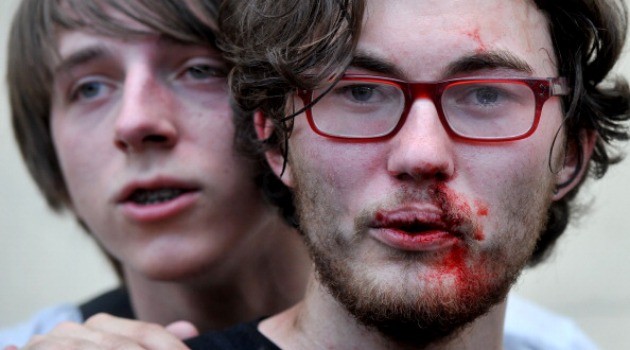Daily Stormer
February 13, 2014

Oh, dear. This isn’t how we wanted this to go down. What good is hating gays if you love the ones who brought us this plague in the first place?
Though I will say that in my experience, all Slavs hate the Jews, without reservation. Though some are perhaps not aware of the extent of the Jewish problem. For instance, many Russians told me proudly that the head of Google was a Russian, to which I replied, “no, he’s a Jew from Russia.” They of course took note that he was indeed not Russian. But I found it somewhat strange that they didn’t already know that.
From the Jewish Daily Forward:
Just three weeks before the start of the 2014 Winter Olympics in Sochi, two dozen Russian reporters, photographers and cameramen squeezed into the spartan first-floor office of the Independent Press Center in Moscow, a five-minute walk from the capital’s main Orthodox church, the Cathedral of Christ the Savior.
The journalists were there to see Ilya Farber, an artist and schoolteacher whose early release from a seven-year prison sentence had earned him a place alongside oligarch Mikhail Khodorkovsky, members of the punk protest group Pussy Riot and the crew of Greenpeace’s Arctic Sunrise, as a symbol of political and judicial abuse in Russia.
Commentators could not help but note that although each was released for a different reason — a pardon, an amnesty, a judicial review — they all walked free in the weeks leading up to the Olympics, which began on February 7.
I had come to see Farber for a slightly different reason: because Western Jewish media perceived Farber’s case as the latest in a long line of outbreaks of anti-Semitism in Russia, stretching back through the persecution of Soviet Jews like Natan Sharansky, the blood libel trial of Menachem Mendel Beilis, czarist pogroms and beyond. This newspaper, to take just one example, reported Farber’s imminent release under the headline “Russian Jew Ilya Farber Ordered Freed — Corruption Trial Tainted by Anti-Semitism.”
But what I found instead was a more complex picture. Unlike Sharansky and Beilis, Farber — as is typical of many people with Jewish backgrounds in Russia today — has only one Jewish parent. He did not have a strong connection to his Jewish identity. Nor did he or other members of the Russian Jewish community view his case as being motivated particularly by anti-Semitism.
Indeed, Russian Jews, while not dismissing the fear out of hand, did not seem overly concerned by anti-Semitism at all. This, at a time when hatred of other minorities, notably against migrant workers from Central Asia, gay men and lesbians, is on the rise.
In the Farber case, the charge of anti-Semitism was based on a single statement made by the prosecutor during Farber’s corruption trial: “Could someone with a surname like ‘Farber’ help a village for free?”
Yet during his two-hour press conference, Farber’s Jewish roots and the prosecutor’s alleged anti-Semitic comment never came up. Instead, Farber, speaking softly and slowly, discussed Russia’s judicial system and prison conditions, issues related to human rights and whether he might one day emigrate from Russia.
Farber cut an incongruous figure, even in cosmopolitan Moscow. Wearing a bright-blue flowing shirt, his long hair pulled back in a ponytail, he looked more as though he just stepped from the stage of the Bolshoi Theatre than from a prison cell. Farber’s mother is Russian, his father is Jewish. If his last name is not enough to give away the paternal half of his identity, then his patronymic, “Isaakovich,” is the clincher.
Ulyana Skoibeda, a journalist who made headlines last year for lamenting that the Nazis did not make lampshades out of the forefathers of today’s Russian “liberals” — a codeword for Jews — flicked at Farber’s Jewish roots in a January 10 column.
Writing in the mass market daily Komsomolskaya Pravda, Skoibeda savaged Farber for theatrically stepping on a pile of five-pointed gold stars when he was released from prison. Farber said the stars were supposed to represent the judicial system that had imprisoned him. But Skoibeda and many others saw this act as an insult to service people and war veterans — people whose service these “Farbers don’t understand.”
Although the incident with the stars diminished sympathy for Farber, Skoibeda’s thinly veiled anti-Semitic column was an outlier. Alexander Verkhovsky, director of the not-for-profit Sova Center, which monitors racism and xenophobia in Russia, said that Skoibeda could only hint at Farber’s Jewish heritage, because openly anti-Semitic statements are not tolerated in the mainstream media. “Since the early 1990s, anti-Semitic discourse has been seen as less and less appropriate,” Verkhovsky said. “Anti-Semitic tones in official language are strictly prohibited.”
Just one generation after Jews fled Russia in the hundreds of thousands, those who remain feel relatively secure. Verkhovsky said that physical attacks on Jews, and vandalism of Jewish sites, are today increasingly rare. In 2012, just two Jews were injured in anti-Semitic assaults across the country, according to Sova Center figures.
That same year, seven people were killed and 35 were injured in attacks on migrants from Central Asia; four people were killed and four were injured in attacks on people from the Caucasus. Indeed, in today’s Russia, Asians, gay people and Jehovah’s Witnesses are more likely to be attacked than Jews.
Sam Kliger, a Russia expert with the American Jewish Committee, said there is “a street-level anti-Semitism” that has always existed in Russia. “And there are, of course, some right-wing nationalistic neo-Nazi groups, though marginal, that also express anti-Semitic views.” But anti-Semitism in Russia is “at the same low level as it was 10 years ago.”
According to Moscow’s small, disparate Jewish community — even according to Farber himself — the Farber trial is not perceived as being particularly motivated by anti-Semitism.
